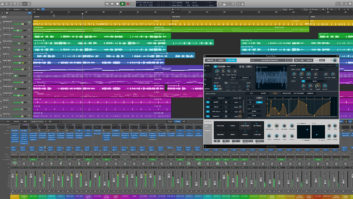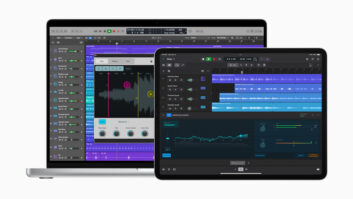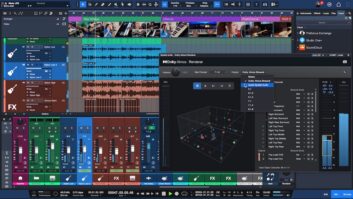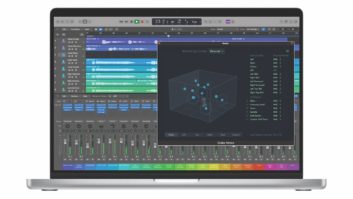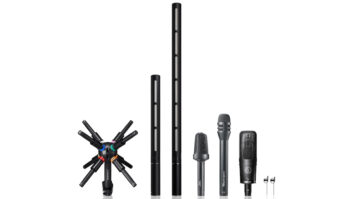“Difficult to see. Always in motion is the future.” —Yoda.
“Stand firm … carry on.” —Winston Churchill.
The latest Apple rumor is that the company is going to replace Intel’s chips with their own starting in 2020. Of course, 2020 is light years away in computer time, and Apple has been known to change its mind. (Seen any Apple cars lately?) While this move makes sense, I’m going to go out on a limb and explain why any angst may be unjustified for audio pros.
In 2016, Apple CEO Tim Cook said, “Some folks in the media have raised the question about whether we’re committed to desktops…. We have great desktops in our roadmap.”
Then in April 2017, Apple senior vice president of worldwide marketing Phil Schiller said the company was completely rethinking the Mac Pro, and talked about an upcoming modular design. He added that the redesign would not appear “this year,” which many interpreted as meaning that it would appear the next, in 2018. Apple didn’t disabuse people of that notion. Maybe Apple was just being coy because plans weren’t firmed up yet, or maybe it was a tactic to discourage people from switching to the suddenly fashionable (and powerful) Microsoft Surface Studio.
Granted, there was a Mac Pro refresh in 2017; both the low-end and high-end models got two more cores and better graphics. But there was no USB-C or Thunderbolt 3 connectivity, or anything fundamentally different in the hardware. Now Apple has committed to a 2019 launch date for the revamped Mac Pro. But will it use Apple chips? Let’s zoom out.
Software Tech: Can Pro Audio Software Sustain? by Craig Anderton, May 24, 2018
Apple is a consumer electronics company, not a computer company. We don’t use consumer machines: they’re today’s equivalent of yesteryear’s mainframes. I may be very wrong, but I don’t see any reason for Apple to jettison Intel’s powerful chips in its most powerful computers. Creating silicon at that level for a fairly insignificant product line (single-digits revenue share) doesn’t seem worth it.
But given that iPhones, iPads, Apple TV and Apple Watches already use ARM processors, I could easily see non-Intel chips working their way into notebooks and iMacs. Apple would not only have better margins, but consumer device technology has to be able to turn on a dime and Apple would no longer be held to Intel’s delivery timelines. The current Mac Mini is over three and a half years old, and the MacBook Air hasn’t changed much since 2010. It’s time for a serious refresh. This would also facilitate merging iOS and macOS, which despite past pronouncements from Apple about wanting to keep them separate, appears inevitable.
Ultimately, I see three possible scenarios:
- The worst one for pro audio Mac users is that Apple decides it isn’t worth the trouble to produce high-power desktops for a small professional market, dumbs them down, boots the Intel chips and cedes the market to Windows.
- A somewhat better option is that Apple starts moving more of iOS (which, let’s face it, needs work) over to macOS and dismantles the wall between the two. The notebooks and iMacs favored by students, companies, home users and others become less expensive, increasing market share. MacOS remains enough like “vintage” macOS that software companies don’t have to go too crazy porting to a new processor architecture or folding the changes into their Intel code. Also, the machines remain powerful enough for pro audio applications that aren’t excessively demanding.
- The best option for pro audio is that Apple follows through with its 2019 modular computers, which are so good that they reignite the Mac Pro line. They continue to use powerful Intel CPUs even while the consumer devices become more ARM-oriented, and macOS still does what we need (even though some will grouse about “consumer creep,” like they did when Logic Pro acquired some GarageBand vibe). And given that pro machines are big investments, Apple decides that the computers are powerful enough for professionals and makes them expandable, giving them a longer usable life. Apple needs to get the design right only once, and the computers can coast for years yet still keep people happy. Maybe the reason for launching in 2019 instead of 2018 is that Apple needed more time to get these right.
For now, I think we can safely follow Winston’s Churchill’s advice (or if you prefer, “Don’t Panic” from The Hitchhiker’s Guide to the Galaxy). But remember, we’re dealing with technology, Apple and rumors. It’s always Yoda who gets the last laugh.
Author/musician Craig Anderton updates craiganderton.com every Friday with news and tips. His latest album, Simplicity, is now available on Spotify and cdbaby.
